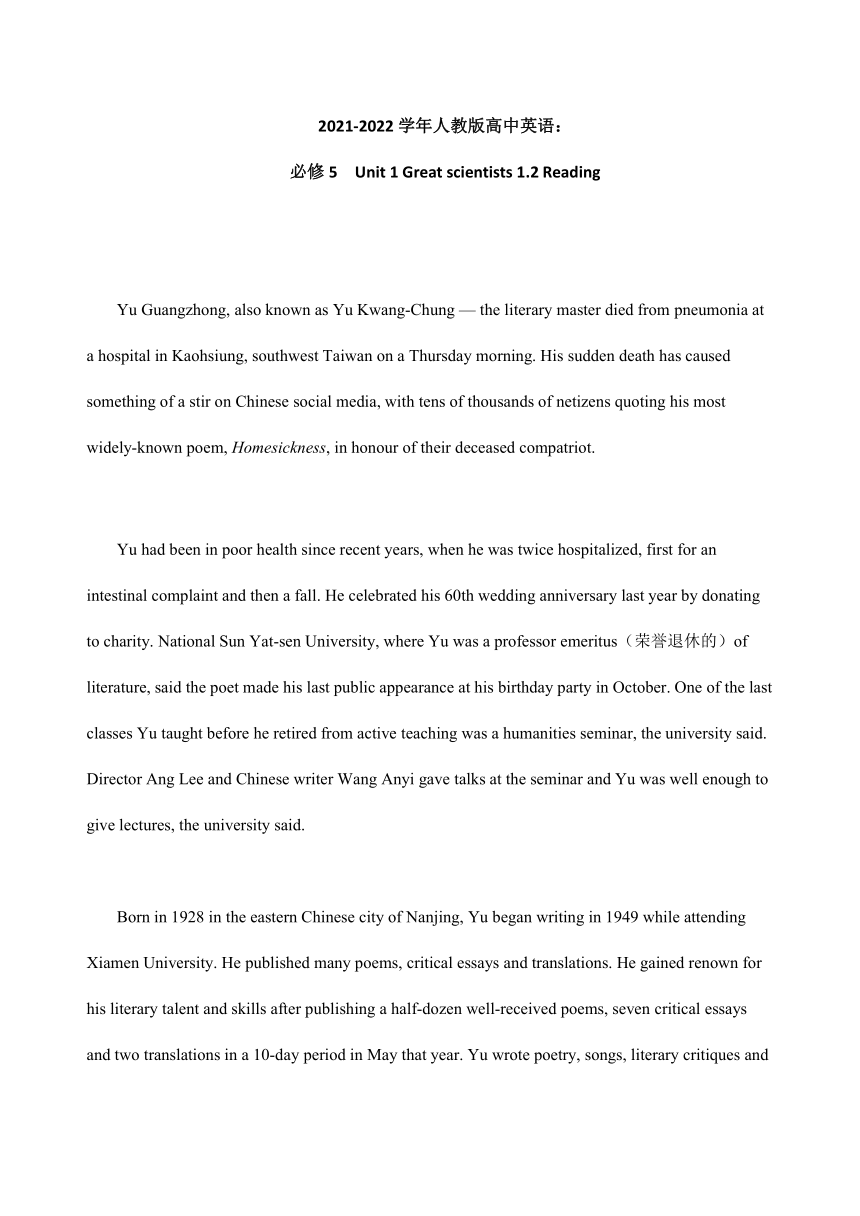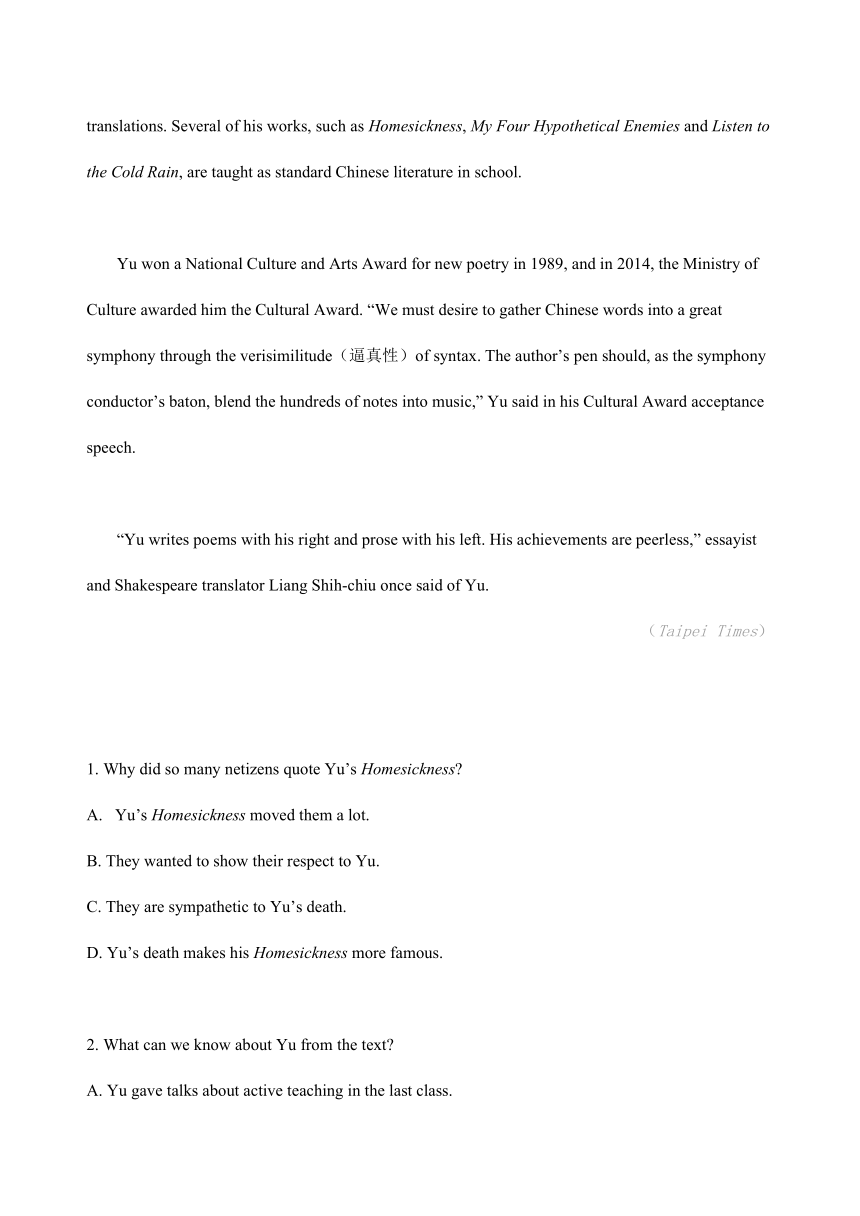2021-2022学年人教版高中英语:必修5 Unit 1 Great scientists 1.2 Reading 作业 (含答案)
文档属性
| 名称 | 2021-2022学年人教版高中英语:必修5 Unit 1 Great scientists 1.2 Reading 作业 (含答案) |

|
|
| 格式 | docx | ||
| 文件大小 | 22.0KB | ||
| 资源类型 | 教案 | ||
| 版本资源 | 人教版(新课程标准) | ||
| 科目 | 英语 | ||
| 更新时间 | 2021-08-16 16:53:35 | ||
图片预览



文档简介
2021-2022学年人教版高中英语:
必修5 Unit 1 Great scientists 1.2 Reading
Yu Guangzhong, also known as Yu Kwang-Chung — the literary master died from pneumonia at a hospital in Kaohsiung, southwest Taiwan on a Thursday morning. His sudden death has caused something of a stir on Chinese social media, with tens of thousands of netizens quoting his most widely-known poem,?Homesickness, in honour of?their deceased compatriot.
Yu had been in poor health since recent years, when he was twice hospitalized, first for an intestinal complaint and then a fall. He celebrated his 60th wedding anniversary last year by donating to charity. National Sun Yat-sen University, where Yu was a professor emeritus(荣誉退休的)of literature, said the poet made his last public appearance at his birthday party in October. One of the last classes Yu taught before he retired from active teaching was a humanities seminar, the university said. Director Ang Lee and Chinese writer Wang Anyi gave talks at the seminar and Yu was well enough to give lectures, the university said.
Born in 1928 in the eastern Chinese city of Nanjing, Yu began writing in 1949 while attending Xiamen University. He published many poems, critical essays and translations. He gained renown for his literary talent and skills after publishing a half-dozen well-received poems, seven critical essays and two translations in a 10-day period in May that year. Yu wrote poetry, songs, literary critiques and translations. Several of his works, such as?Homesickness,?My Four Hypothetical Enemies?and?Listen to the Cold Rain, are taught as standard Chinese literature in school.
Yu won a National Culture and Arts Award for new poetry in 1989, and in 2014, the Ministry of Culture awarded him the Cultural Award. “We must desire to gather Chinese words into a great symphony through the verisimilitude(逼真性)of syntax. The author’s pen should, as the symphony conductor’s baton, blend the hundreds of notes into music,” Yu said in his Cultural Award acceptance speech.
“Yu writes poems with his right and prose with his left. His achievements are peerless,” essayist and Shakespeare translator Liang Shih-chiu once said of Yu.
(Taipei Times)
1. Why did so many netizens quote Yu’s?Homesickness?
A. ?Yu’s?Homesickness?moved them a lot.
B. They wanted to show their respect to Yu.
C. They are sympathetic to Yu’s death.
D. Yu’s death makes his?Homesickness?more famous.
2. What can we know about Yu from the text?
A. Yu gave talks about active teaching in the last class.
B. Yu was famous for writing literary critiques and songs.
C. Yu celebrated his 60th birthday at National Sun Yat-sen University.
D. Yu is enthusiastic about Chinese words.
3. What does Liang Shih-chiu think of Yu?
A. Yu likes poetry rather than prose.
B. Yu can write both poems and prose.
C. Yu’s contribution to literature is priceless.
D. Yu writes poems with his right hand.
4. What is the passage mainly about?
A. People’s sadness for Yu’s death.
B. Yu’s unique position in literature.
C. People’s favorite literary works by Yu.
D. Yu’s experiences and achievements.
参考答案
1–4 BDCD
生词及长难句
1.?pneumonia???n.肺炎
2.?compatriot???n.同胞
3.?philharmonic???adj.爱好音乐的
4.?verisimilitude??n.逼真
5.?syntax???n.句法
6.?blend???v.融合
7.?in honor of?向……致敬
8.?literary critiques?文学评论
知识背景
余光中(1928年10月日—2017年12月14日),当代著名作家、诗人、学者、翻译家,被誉为文坛的“璀璨五彩笔”。其代表作有《乡愁》、《白玉苦瓜》、《心有猛虎细嗅蔷薇》等。九十载人生沉淀,聊人情世故,谈游记见闻,撰文化随感,诉人生感悟。在余光中先生的文字里,每一个人都可以找到独属于自己的一份乡愁、记忆和青春。余光中先生热爱中华传统文化,热爱中国。礼赞“中国,最美母亲的国度”。他说:“蓝墨水的上游是汨罗江”,“要做屈原和李白的传人”,“我的血系中有一条黄河的支流”。呼吸在当今,却已经进入了历史,他的名字已经显目地镂刻在中国新文学的史册上。
余光中先生走了,在七十年的台湾文化史上,是一个时代的结束。从疼痛彻骨的迁徙流亡思乡,到意气风发的“希腊天空”的追寻,到回眸凝视决定拥抱枋寮的泥土,到最后在自己拥抱的泥土上又变成异乡人,余光中先生的一生就是一部跨世纪的疼痛文化史。
诗歌欣赏
乡愁
小时候,
乡愁是一枚小小的邮票,
我在这头,
母亲在那头。
长大后,
乡愁是一张窄窄的船票,
我在这头,
新娘在那头。
后来啊,
乡愁是一方矮矮的坟墓,
我在外头,
母亲在里头。
而现在,
乡愁是一湾浅浅的海峡,
我在这头,
大陆在那头。
Nostalgia
When I was young, ?
my homesickness was a small stamp, ?
I was here, ?
my mother was there. ?
After growing up, ?
my homesickness was a narrow ticket, ?
I was here, ?
my bride was there. ?
Later, ?
my homesickness was a little tomb, ?
I was outside, ?
my mother was inside. ?
And now, ?
my homesickness is a shallow strait, ?
I am here, ?
the mainland is there.
必修5 Unit 1 Great scientists 1.2 Reading
Yu Guangzhong, also known as Yu Kwang-Chung — the literary master died from pneumonia at a hospital in Kaohsiung, southwest Taiwan on a Thursday morning. His sudden death has caused something of a stir on Chinese social media, with tens of thousands of netizens quoting his most widely-known poem,?Homesickness, in honour of?their deceased compatriot.
Yu had been in poor health since recent years, when he was twice hospitalized, first for an intestinal complaint and then a fall. He celebrated his 60th wedding anniversary last year by donating to charity. National Sun Yat-sen University, where Yu was a professor emeritus(荣誉退休的)of literature, said the poet made his last public appearance at his birthday party in October. One of the last classes Yu taught before he retired from active teaching was a humanities seminar, the university said. Director Ang Lee and Chinese writer Wang Anyi gave talks at the seminar and Yu was well enough to give lectures, the university said.
Born in 1928 in the eastern Chinese city of Nanjing, Yu began writing in 1949 while attending Xiamen University. He published many poems, critical essays and translations. He gained renown for his literary talent and skills after publishing a half-dozen well-received poems, seven critical essays and two translations in a 10-day period in May that year. Yu wrote poetry, songs, literary critiques and translations. Several of his works, such as?Homesickness,?My Four Hypothetical Enemies?and?Listen to the Cold Rain, are taught as standard Chinese literature in school.
Yu won a National Culture and Arts Award for new poetry in 1989, and in 2014, the Ministry of Culture awarded him the Cultural Award. “We must desire to gather Chinese words into a great symphony through the verisimilitude(逼真性)of syntax. The author’s pen should, as the symphony conductor’s baton, blend the hundreds of notes into music,” Yu said in his Cultural Award acceptance speech.
“Yu writes poems with his right and prose with his left. His achievements are peerless,” essayist and Shakespeare translator Liang Shih-chiu once said of Yu.
(Taipei Times)
1. Why did so many netizens quote Yu’s?Homesickness?
A. ?Yu’s?Homesickness?moved them a lot.
B. They wanted to show their respect to Yu.
C. They are sympathetic to Yu’s death.
D. Yu’s death makes his?Homesickness?more famous.
2. What can we know about Yu from the text?
A. Yu gave talks about active teaching in the last class.
B. Yu was famous for writing literary critiques and songs.
C. Yu celebrated his 60th birthday at National Sun Yat-sen University.
D. Yu is enthusiastic about Chinese words.
3. What does Liang Shih-chiu think of Yu?
A. Yu likes poetry rather than prose.
B. Yu can write both poems and prose.
C. Yu’s contribution to literature is priceless.
D. Yu writes poems with his right hand.
4. What is the passage mainly about?
A. People’s sadness for Yu’s death.
B. Yu’s unique position in literature.
C. People’s favorite literary works by Yu.
D. Yu’s experiences and achievements.
参考答案
1–4 BDCD
生词及长难句
1.?pneumonia???n.肺炎
2.?compatriot???n.同胞
3.?philharmonic???adj.爱好音乐的
4.?verisimilitude??n.逼真
5.?syntax???n.句法
6.?blend???v.融合
7.?in honor of?向……致敬
8.?literary critiques?文学评论
知识背景
余光中(1928年10月日—2017年12月14日),当代著名作家、诗人、学者、翻译家,被誉为文坛的“璀璨五彩笔”。其代表作有《乡愁》、《白玉苦瓜》、《心有猛虎细嗅蔷薇》等。九十载人生沉淀,聊人情世故,谈游记见闻,撰文化随感,诉人生感悟。在余光中先生的文字里,每一个人都可以找到独属于自己的一份乡愁、记忆和青春。余光中先生热爱中华传统文化,热爱中国。礼赞“中国,最美母亲的国度”。他说:“蓝墨水的上游是汨罗江”,“要做屈原和李白的传人”,“我的血系中有一条黄河的支流”。呼吸在当今,却已经进入了历史,他的名字已经显目地镂刻在中国新文学的史册上。
余光中先生走了,在七十年的台湾文化史上,是一个时代的结束。从疼痛彻骨的迁徙流亡思乡,到意气风发的“希腊天空”的追寻,到回眸凝视决定拥抱枋寮的泥土,到最后在自己拥抱的泥土上又变成异乡人,余光中先生的一生就是一部跨世纪的疼痛文化史。
诗歌欣赏
乡愁
小时候,
乡愁是一枚小小的邮票,
我在这头,
母亲在那头。
长大后,
乡愁是一张窄窄的船票,
我在这头,
新娘在那头。
后来啊,
乡愁是一方矮矮的坟墓,
我在外头,
母亲在里头。
而现在,
乡愁是一湾浅浅的海峡,
我在这头,
大陆在那头。
Nostalgia
When I was young, ?
my homesickness was a small stamp, ?
I was here, ?
my mother was there. ?
After growing up, ?
my homesickness was a narrow ticket, ?
I was here, ?
my bride was there. ?
Later, ?
my homesickness was a little tomb, ?
I was outside, ?
my mother was inside. ?
And now, ?
my homesickness is a shallow strait, ?
I am here, ?
the mainland is there.
